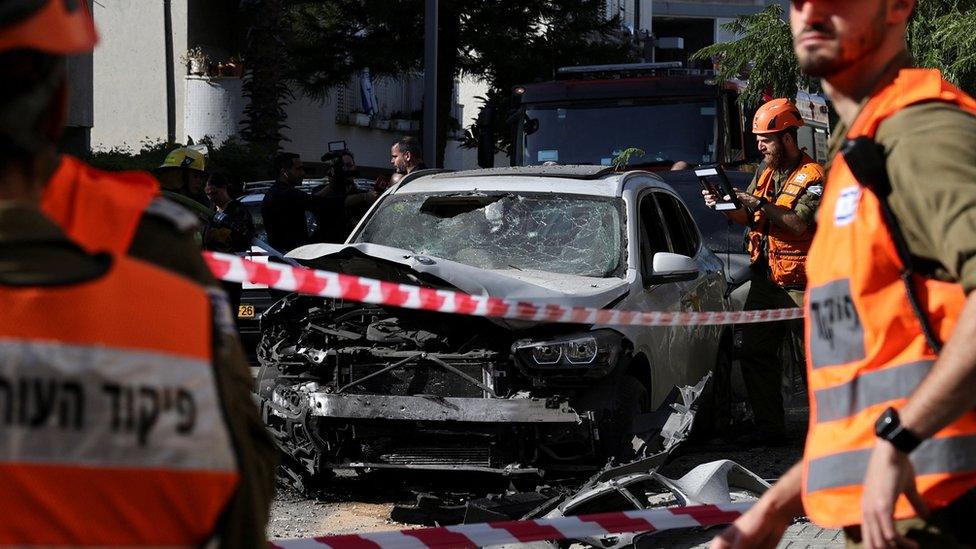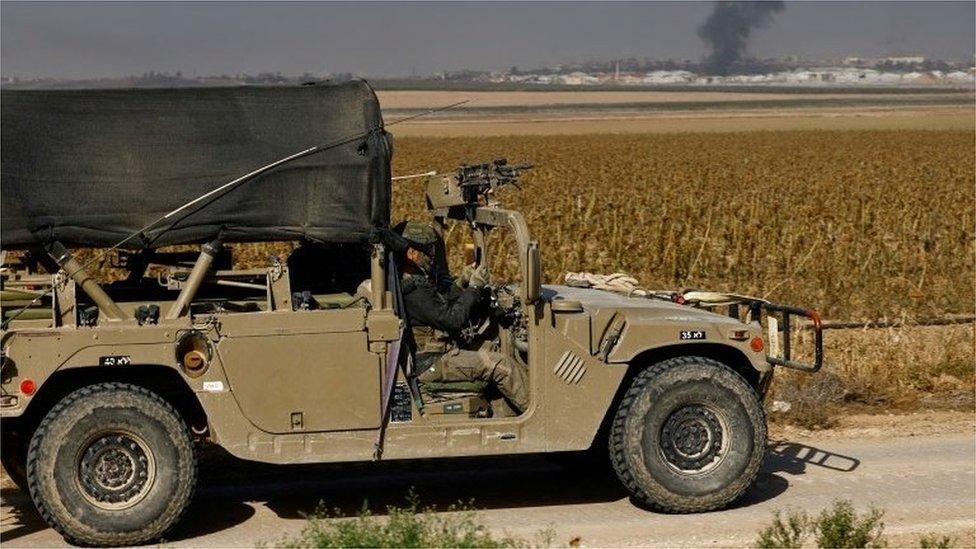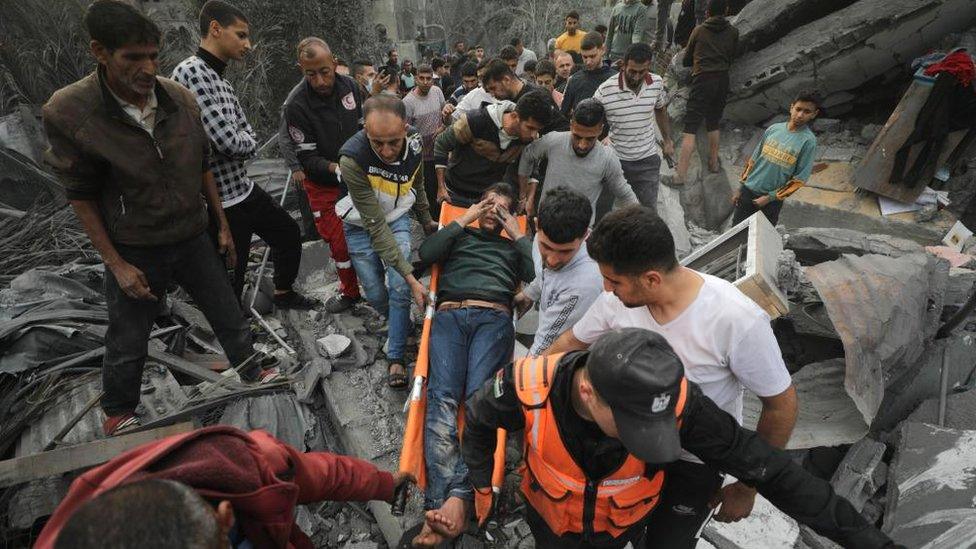Israel determined to finish Gaza operation despite civilian suffering
- Published

Holon in central Israel was hit by a rocket attack on 11 December
Israel is on holiday. Schools are out, and away from the frontline areas the shopping centres are full. Cake shops are bursting with the doughnuts that Jews like to eat during Hanukkah, the current religious festival.
It is different the closer you get to the fighting. Along the Gaza border, the area known by Israelis as the "envelope", tanks and troops are moving, civilians are mostly elsewhere and it looks like a war zone.
In the north, along the border with Lebanon, communities have also been evacuated and the military continues to exchange fire with Iran's strongest ally, Hezbollah.
But casual visitors might be able to deceive themselves that life has somehow returned to "normal" in central Israel, the broad swathe of land between Jerusalem and Tel Aviv.
A sharp reminder of how wrong that impression would be came as I drove down to Tel Aviv.
The air raid sirens started, and the red alert app Israelis have on their phones sent out warnings as cars swerved onto the hard shoulder so the people inside could stop to take cover. Other drivers accelerated to speed out of the area. In the confusion, three cars managed to crash into each other.
We pulled over as a group of women left their car and held each other in a tight, terrified embrace.
Overhead, vapour trails from the Iron Dome anti-missile system arched towards the rockets coming from Gaza, loud explosions cracking across a deep blue sky as they downed most of the projectiles. One man was injured, in Holon, just off the highway.
Israelis' deep trauma
The fact that Hamas can still attack Israel is more proof that it is not beaten. The response of the motorists shows the depth of the trauma Hamas has inflicted on Israel, which is without doubt good news for the leaders of Hamas. Israel believes they are somewhere under Gaza, in some part of the tunnel system.
"First of all, forget everything you thought you knew about Israel before 7 October. It's all changed," Amos Yadlin, a retired major-general said as we set up for an interview in his office in Tel Aviv, overlooking Israel's defence ministry. Mr Yadlin was a veteran fighter pilot who retired as head of Israeli military intelligence.
We decided to interview him to get an idea of Israel's war strategy. In the end everything he said was just as interesting for what it said about mood in Israel.
Mr Yadlin repeatedly compared Israel's fight against Hamas to World War Two. He was defending the huge number of killings by Israel of Palestinian civilians in the Gaza Strip, and making the point that eliminating Hamas was vital for Israel's future.
In a reference to the destruction of Dresden in Germany by the RAF in 1945, Mr Yadlin said: "You bombed Dresden with 120,000 people, killed women, children. We are trying to avoid this collateral damage. We ask them to leave. We ask them to go to the southern part of Gaza."
I reminded him that Israel was also bombing the areas they had told Palestinians would be safe. Mr Yadlin insisted Israel was bombing Hamas, not civilians.
"No, we didn't bomb them. We bombed the Hamas targets. Only Hamas targets and Hamas uses them as a human shield."

Israel's war with Hamas is now in its ninth week
He dismissed criticisms by the Biden administration in the US that Israel was killing too many Palestinian civilians. He said Israel was more careful about avoiding civilian casualties than the US and UK had been when they were bombing jihadist groups in Syria and Iraq.
His interpretation is not shared by former generals involved in the wars in Iraq and Afghanistan. A senior British officer told me he was appalled by Israel's disdain for the laws of war that mandate the protection of civilians. He said it would not be allowed in the British army.
Amos Yadlin, who still advises his successors in the Israeli military, believes Israel needs more time to reach its ambitious objectives in Gaza. It wants to rescue its hostages, kill the leaders of Hamas, annihilate it as a military formation that can threaten Israelis and destroy its capacity to govern.
I pointed out that even though the US had vetoed the latest ceasefire resolution it was signalling that Israel had weeks not months to finish what it wanted to do.
"It is not enough to achieve the goal," said Mr Yadlin. "If there is a ceasefire without returning the rest of the hostages, there will be no ceasefire."

More on Israel-Gaza war
Follow live: Latest updates
Explained: Jeremy Bowen: The status quo is smashed
Israel: Bringing broken survivors of the Nova festival attack back from darkness
History behind the story: The Israel-Palestinian conflict

Israel has an immensely powerful army and the backing of the US. But it is discovering that for all its deep conviction that it has no choice other than to destroy Gaza to eradicate Hamas, allies as well as critics are appalled by the way it has killed more than 18,000 Palestinians, of which perhaps half were children.
Israel has also discovered, as the Americans and others warned, that fighting a determined and prepared enemy in a built-up area is one of the hardest military jobs.
As Amos Yadlin indicated, though, the Israelis look determined to push through the criticism to reach their objectives. After that comes the thorny issue about the governance and reconstruction of Gaza.
Mr Yadlin said there would be no long Israeli occupation of Gaza, but if the current leadership's determination to control the strip for the foreseeable future does not change, occupation looks certain.
Related topics
- Published8 December 2023
